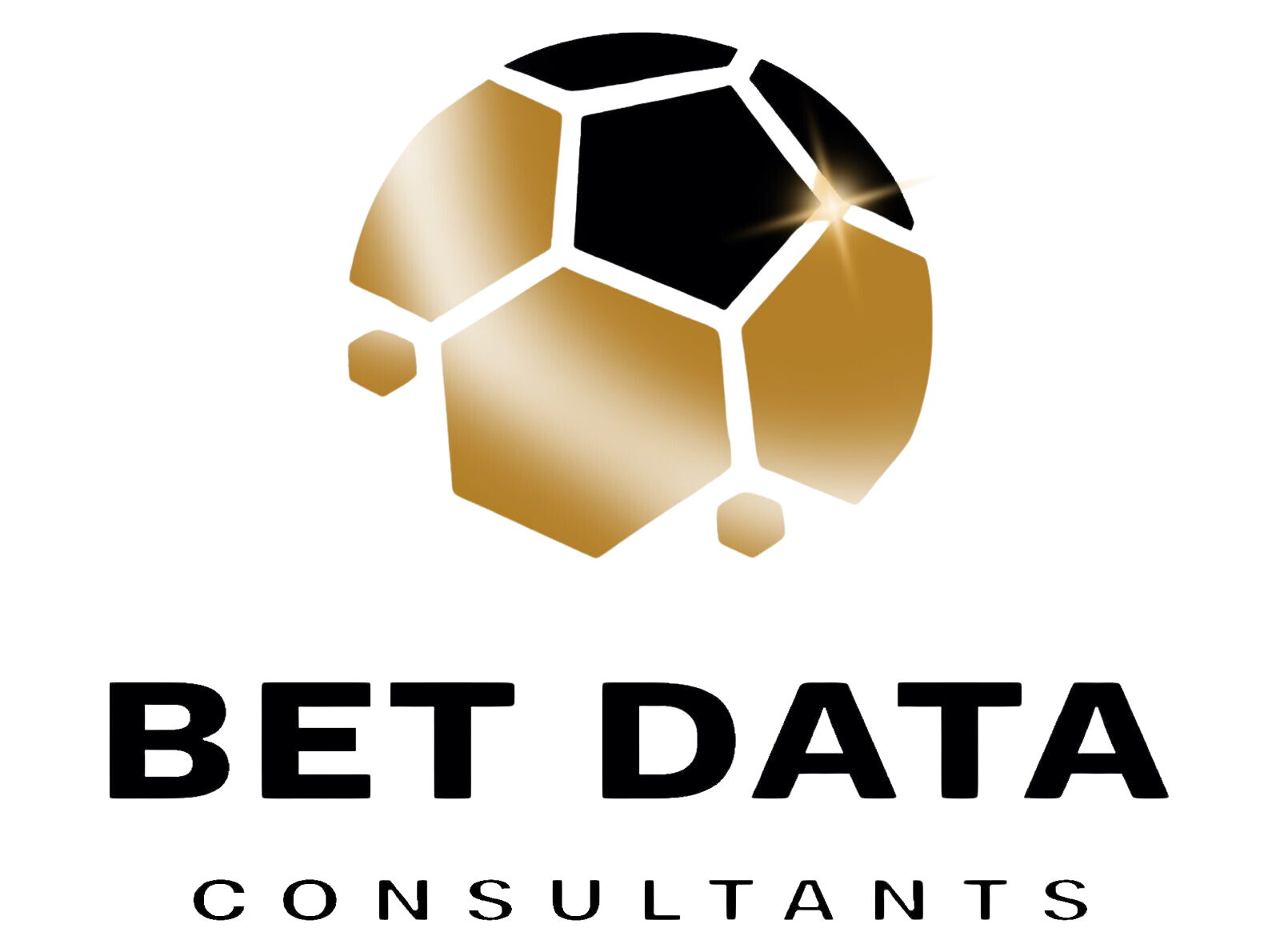
You’re sitting in your monthly business review meeting. Terry, your CRM director—someone you’ve worked with before, someone you trust and hired—is presenting the numbers. He’s confident, walking you through key metrics, saying engagement is up, players are sticking around longer, and things are moving in the right direction.
But here’s the thing: you’ve seen the data. You know that not every month has been as good as he’s making it sound. Some months have seen a big dip, and something just isn’t adding up.
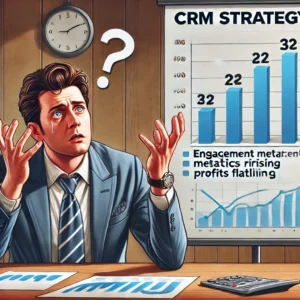
Why Your CRM Strategy is Failing
You hired Terry (familiarity bias) because he delivered great results for you at your last company, and you know he’s skilled at what he does. But here’s the thing—it’s probably not Terry’s fault. It’s not about his ability or hard work. What’s happening here goes much deeper; it’s rooted in human nature and evolution.
Terry, like most of us, is suffering from a cognitive bias—a mental shortcut that’s well-documented in research. In fact, studies show that 80-90% of people are affected by cognitive biases in different areas of life.
These biases influence our decisions, our interpretations of data, and even our ability to adapt when something isn’t working as well as we think it is.
Let’s break this down further…
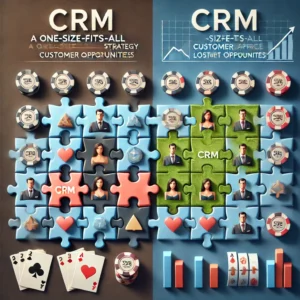
1. One-Size-Fits-All Isn’t Cutting It
You’re starting to realize that what worked in your last company may not automatically work here. Terry is falling into the Sunk Cost Fallacy—he’s overly invested in a strategy that worked before, and he’s reluctant to change course, even when the signs are there.
In McKinsey’s 2019 study, it was found that businesses that tailored their CRM strategies to the unique characteristics of their audience saw a 15% boost in customer retention.
Terry’s strategy might have been spot-on for the experienced punters at your previous company, but is it resonating with the casual players you’re working with now? The signs suggest otherwise. Sticking to a one-size-fits-all approach is likely leaving profits on the table.
Data Insight: Businesses that tailor their CRM strategies to their specific customer base are 30% more likely to see a positive impact on profitability.

2. Groupthink: A Silent Profit Killer
Let’s be honest: you hired Terry, you’ve worked with him before, and you’ve probably told the whole team how good he is. They trust him because you trust him. But this could be leading to groupthink, where no one feels comfortable questioning his approach. Everyone wants to stay aligned with the strategy, even if they have doubts.
In business, almost everyone stays silent when they disagree with the senior team’s strategy because they don’t want to be seen as wrong—that’s loss aversion bias at play.
A study by Gallup showed that companies fostering diverse and open discussions saw a 25% increase in overall team performance, with more innovation and profitability coming from fresh ideas. In iGaming, where customer preferences can change rapidly, a stagnant CRM strategy due to groupthink can be particularly harmful.
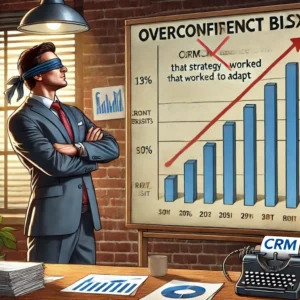
3. Overconfidence Bias: The Trap of Past Success
Terry has always delivered for you. You’ve both seen success together in the past. But that’s exactly the danger—overconfidence bias. Success in the past can make it hard to admit when things aren’t going as planned now.
Maybe Terry’s cherry-picking data to support the story he wants to tell. Maybe neither of you wants to face the fact that this strategy isn’t working as well as it used to.
It’s tough to admit when a strategy is failing—no one likes to be wrong (loss aversion bias), especially not in front of a room full of colleagues. But if you keep pushing down the same path out of loyalty or fear of failure, you could be leaving profits on the table
A report from Harvard Business Review found that businesses that regularly reassess and pivot their CRM strategies based on real-time data see a 40% improvement in long-term profitability. This highlights the importance of overcoming biases and making data-driven decisions rather than relying on past successes.
Practical Steps to Overcome CRM Biases in iGaming
To overcome these biases and ensure your CRM strategies lead to real profitability, here are some actionable steps:

1. Reassess Regularly
Even though Terry has a track record of success, it’s crucial to regularly audit your CRM campaigns. Just because engagement is up doesn’t mean the strategy is driving profits.
By looking deeper into real-time data, you might find that certain segments of your audience aren’t converting as expected.
A report by Forrester showed that companies with a dynamic CRM strategy—one that adapts to changing conditions—see a 20% higher customer lifetime value than those sticking to a static approach

2. Foster Open Dialogue
In your review meetings with Terry, it’s important to create a culture where everyone feels comfortable speaking up, even if it means questioning a strategy that Terry or leadership supports.
A Stanford study found that teams that encouraged open discussions and diverse viewpoints experienced a 30% improvement in innovation, leading to more effective solutions.

3. Segment Your Segments
To truly succeed, you need to break down your player base into smaller, more defined segments. In many businesses we’ve worked with, we’ve found that just 1-5% of the customer base is responsible for generating 50% of the profits.
This highlights the importance of refining your segments and tailoring your strategies based on real data.

4. Test and Pivot
While Terry’s strategy might have worked well in the past, it’s crucial to continuously A/B test your CRM efforts and be ready to pivot when things aren’t performing as expected.
What worked for one player segment may not work for another, and sticking to the same approach without testing can result in missed opportunities.
Data from Statista shows that companies that frequently test and adjust their CRM efforts see a 37% increase in customer retention.
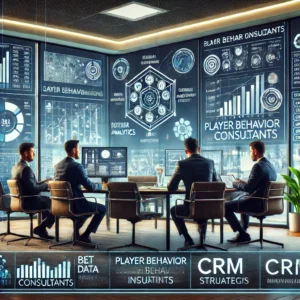
5. Hire Experts
Unfortunately, if you’ve noticed any of these behaviors in your business, it’s almost certain that knowledge alone won’t be enough to spark change. This is due to the “knowledge-action gap bias”—when people have the right information but fail to act on it, often due to inertia, fear of change, or feeling overwhelmed by the complexity of implementation.
That’s why so many data-driven companies in the iGaming industry are turning to Bet Data Consultants. We understand that knowing the right strategy is only half the battle—execution is what truly matters.
As the only iGaming consultancy that blends cutting-edge strategies rooted in world-class behavioral science with over 15 years of industry expertise, we bridge the gap between knowledge and action, transforming insights into profitable results for your business.

Final Thoughts: Combine Science with Expertise
If you want to drive real results, you need to consistently reassess, challenge assumptions, and tailor your CRM strategy to the current behaviors of your audience. Otherwise, you’ll keep spinning your wheels while the competition moves ahead.
To truly unlock the full potential of your CRM strategy, you need to combine the best modern science with deep industry expertise. Bet Data Consultants can help. We offer a free consultation and will happily identify and strategize one area of your iGaming business for free to demonstrate the value we bring to all our clients.
Contact us on LinkedIn or email us at info@betdataconsultants.com for a free consultation today.
